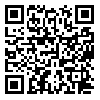Volume 14, Issue 4 (7-2014)
Iranian Journal of Medical Education 2014, 14(4): 323-331 |
Back to browse issues page
Download citation:
BibTeX | RIS | EndNote | Medlars | ProCite | Reference Manager | RefWorks
Send citation to:



BibTeX | RIS | EndNote | Medlars | ProCite | Reference Manager | RefWorks
Send citation to:
Mohammadi S, Yazdan Nik A R, Yousefy A, Arazi T M. A Glimpse in the Challenges in Iranian Academic Nursing Education. Iranian Journal of Medical Education 2014; 14 (4) :323-331
URL: http://ijme.mui.ac.ir/article-1-3146-en.html
URL: http://ijme.mui.ac.ir/article-1-3146-en.html
Critical Care Department, Nursing and Midwifery Faculty, Isfahan University of Medical Sciences, Isfahan, Iran , sepidmohamadi@nm.mui.ac.ir
Abstract: (12001 Views)
Introduction: Nursing concepts has been developed and made in academic education. Nursing education in Iran has experienced many ups and downs by far. Once viewed as a technical discipline, nursing has changed to the paradigm of nursing as a science and as an art. It has become a university discipline in Iran also but the quality of nursing care and clinical knowledge transfer faced serious challenges. In this study we explore the challenges in four areas of teacher, student, lesson plans, and teaching environment.
Methods: This review article was developed through searching scientific databases and literature published during 1995-2013 on academic education of nursing discipline in Iran. Search engines and databases used in this study were Elsevier, Wiley Blackwell, PubMed, Iran Medex, SID, and Medlib. Totally 60 articles in this field were retrieved and according to their appropriateness with challenges in academic nursing education, 19 articles were used in the study.
Results: The most important challenges in nursing education were as follows: there are no fundamental concepts of nursing in lesson plans in bachelors’ level and the dominant biomedical paradigm in lessons, moves students toward becoming a physician assistant. Professional attitude of nursing teachers are far different from ideal conditions expected in nursing and the academic image provided by teachers is not identical to a clinical nursing image. Nursing students also do not have an appropriate attitude toward their own profession to the extent that they know nursing as a job, and not as an evolutionary specific profession. Academic environment also, not only doesn’t develop critical thinking but also suppresses this ability.
Conclusion: The consequences of ineffective academic education in Iran are: lack of applicable knowledge for dealing with real clinical situation, students confusion about university education inconsistency of the academic staff with clinical staff, and failure to view the proper image of nursing by clients and community. With regard to the before mentioned challenges, it seems necessary to invest on academic nursing education in order to solve these problems.
Keywords: Challenges, academic education, nursing, nursing curriculum, nursing education environment.
Type of Study: Review article |
Subject:
Community Based Medicine
Received: 2014/02/25 | Accepted: 2014/05/25 | Published: 2014/06/29 | ePublished: 2014/06/29
Received: 2014/02/25 | Accepted: 2014/05/25 | Published: 2014/06/29 | ePublished: 2014/06/29
Send email to the article author
| Rights and permissions | |
 |
This work is licensed under a Creative Commons Attribution-NonCommercial 4.0 International License. |




